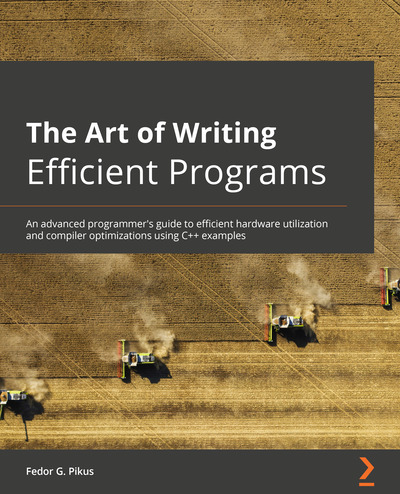Book Review: Fedor Pikus’ The Art of Writing Efficient Programs

The other day I received a pre-release review copy of Fedor Pikus’s new book, The Art of Writing Efficient Programs (Packt Publishing, 2021). Here’s my review of it. TLDR: it’s very good! I don’t say that about just any book; and for a review copy from Packt, this book definitely exceeded my expectations.
This is a very good book, and contains material that should be of interest even to people who don’t work in super “high performance” environments.
Fedor does well to begin with the fact that the meaning of “performance” is context-dependent, and the hard medicine that performance must be measured, not guessed at. The extended example on pages 21–28 is a bit hard to follow, but definitely illustrates how performance can sometimes be affected by microscopic, seemingly irrelevant changes. The worked examples on
perf,google-pprof, and Google Benchmark are valuable.I’m glad that Fedor repeatedly focuses on the importance of communicating with the human reader of the code (for example, page 219 on the connotations of
AtomicCounterversusAtomicIndex). There are other bits of good advice sprinkled throughout; for example, “prefer composition over inheritance” comes up on page 236 in the context of inheriting fromstd::stack, and “constmeans thread-safe” comes up on page 241.The book could almost just have been called “Concurrent Programming,” because that’s the focus of the hefty Part 2. There is quite a bit of material here on multi-threaded and even lock-free data structures, such as stacks, queues, and lists. Lock-free programming is hard; often it’s better to stick with a simple mutex lock or redesign one’s algorithm to remove the need for thread-safe data structures. And Fedor again gives good advice by repeatedly emphasizing this point (page 273), as well as “Implement the minimal necessary interface” (pages 258 and 281).
The discussion of C++20 coroutines (pages 290–303) is extremely clear and correct. I noticed a few insignificant errata, such as referring to
co_returnas an “operator” instead of a “statement,” but really this is a surprisingly good explanation of core coroutine support. And it cuts off at precisely the right point, refusing to speculate either on best-practice patterns or on comparative performance, given that the compiler support is still immature at best. The book ends with a good clear discussion of undefined behavior.As usual for Packt publications, the end-of-book index leaves a lot to be desired. [Although it’s better than the index for my own Packt book four years earlier.]
All in all, there’s a lot of valuable material here. I recommend this book.
Full disclosure: This review was actively “solicited” by the publisher; but “paid” only in the sense that I got a review copy of the book. If you buy Fedor’s book from the Amazon link above, I get a few cents via Amazon Affiliates, although I’m probably taking those few cents away from Fedor. :) Now, the way I’d really get paid is if you bought my book, Mastering the C++17 STL (Packt, 2017)!
